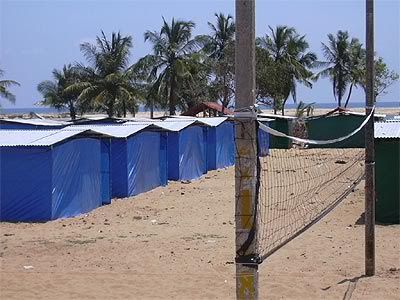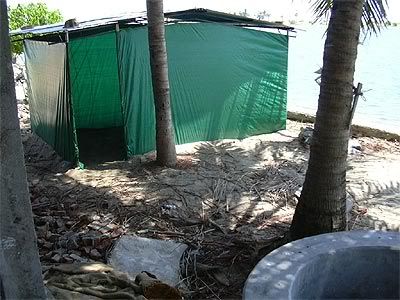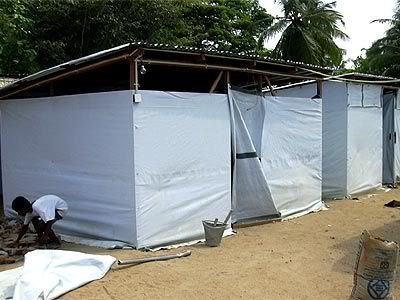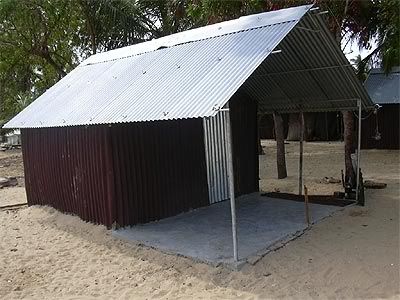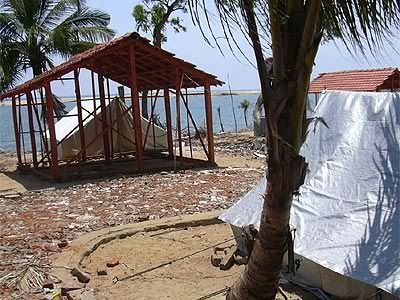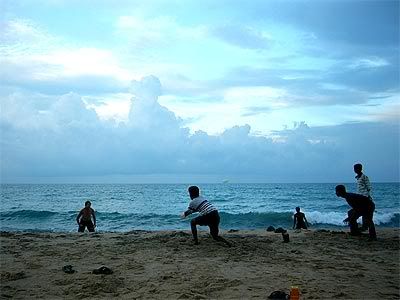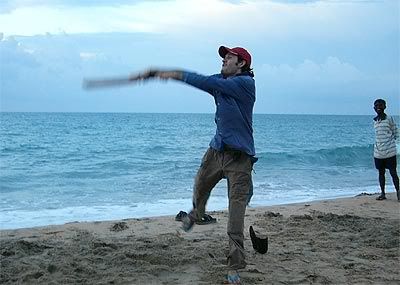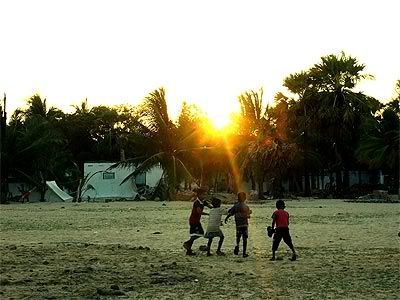...and 2 months since the tsunami hit, and it's kind of an interesting feeling I have arriving back in Kallar from 5 days in Colombo. Overall, the relief & development senimar was not really worth the time taken to travel back to Colombo and attend. It really was about basic project management, about including the correct people when planning and implementing a project, about how to monitor and report on your relief (ie. project) work, with no specifically relevant info at all. Project Management 101 to be exact. The most valuable thing to come out of the three days was a list of resources and contacts for further info on relief and development resources and training, which may actually be relevant, but more on that later...
Anyway, as I said, back in Kallar now, and it was a little bit disappointing to find that a few things that I had left for people to do had not been done.
We have a few volunteers here at the moment who are only here for a short time - a couple of weeks at most - which is a slight change from those who arrived straight after the tsunami and were here for a month, or even more for a couple of them. And with their shorter committment there seems to be a slight change in the amount of effort and ownership of projects. Maybe it's the "hey I'm in Sri Lanka for a while so I'll go and help out in the tsunami area", mostly to say that they've done it rather than any real desire to make a difference. Cynical bastard ain't I? I don't know, could be just a tired and frustrated comment after a really tiring train trip last night, but there are a few things that I had asked a couple of the guys to take ownership of that haven't been pursued - to do with the sanitation for the shelter camps amongst other things - and that I'll have to take over again and see them done after these guys leave on Wednesday, things which really only required a day or so's perseverance (sp?) and effort.
Politics, and self-interested NGOs
I ran across an English guy in Colombo I'd met in Kallar, who had passed through lookng for areas in which the NGO he had volunteered for could do some work. The NGO - Impact (or Impakt, not sure) Aid - was a real estate business in Colombo run by an American or Canadian (not sure, haven't got their history yet) couple until the tsunami hit, and then went into the relief business due to the overwhelming need. There's actually been a few NGO's that sprung up within Sri Lanka after the tsunami, some to more effect than others. From all reports Impact Aid has been one of the more effective newbies.
Anyway, after a number of beaurocratic dramas on the east coast trying to set up a couple of relief camps, and realising that the east had slowly been inundated with NGO's and money after the initial early delays with the focus on the south, he headed back to the west coast, and is currently working just an hour or so south of Colombo, near the town of Morotuwa, where apparantly no other NGO or government agencies have been working at all. This is apparantly due to the affected peoples being gypsy-type, previously living in a ramshackle area between the railway tracks and the ocean that was not "officially" recognised by the government. Hence thay are now being ignored. So while the rest of the country has had tents and water supplied, and are now moving into shelters both in camps and on their own land in some cases (no one can build within 200m of the shore now), these people are still living in schools, temples and similar such buildings.
And apparantly just a week ago a truckload of tents destined for the area had been "confiscated" by the government, officially because the period for distributing tents has now ended and we are in the shelter building phase. Easy to say if you have a home, and if you haven't been told that you must vacate the school you're living in within 2 weeks!
Another interesting though unfortunate aside to the work their doing over there... they apparantly had an Australian doctor volunteering for a while, who then went back to Aus and mentioned to somebody that the Red Cross were "bloody useless" and not addressing some basic and immediate needs in the area she had been in. This got passed on in some way or other to the Red Cross in Australia and then to Sri Lanka, who called up Pam, one of the directors of Impact, taking issue with the comment coming from one of her "employees". She pointed out that all those helping Impact were volunteers, and she had no control over anything any volunteer chose to say. The guy them asked here what Impact's view was, to which she replied that she would love if the Red Cross could help out in their area, that she had a list of all the camps they had created, and all the families within the camps. The Sri Lankan Red Cross caller's reply?
"I'm not interested in that, I am calling about the comment that was made."
Even her attempt to say, "let's move on from that", and let's look at how you could help these people, didn't change the guy's tact, he just wasn't interested. And then I also heard from one of the guys here about one of the Red Cross organisations I'd mentioned in a previous email, who caused all the dramas in Aragum Bay, taking some of the local hotel owners from Aragum Bay to court in Geneva for libel due to the comments they made because of all the crap that was caused. Damn, while I realise there will always be another side to these stories, still seems like a lot of crap being thrown around when more help could be offered instead...
Anyway, and overall, hence my "interesting" mood at the moment. Here in Kallar, we're approaching the end of the shelter construction period. Along with the shelters, the water and sanitation needs of the community are being met. After that, in practical terms, we move onto building longer term shelters on their own land, and then permanent housing (which is its own beaurocratic nightmare in itself, but that's another story). In less tangible terms we move into community and psycho-social development, working with members of the community on a number of social and health programs. However, as important as these areas are to the long term rebuilding and health of this community, I'm having some difficulty in aligning myself to stay during this period while there are other areas of the country that are still struggling for the basics in order to live, and a small NGO working in these areas that could use my help, passion and (limited) experience.
Apart from the different stages outlined above, there is also the fact that overall, us independant guys working out of the YMCA really are simply assisting the actual NGO and relief agencies. This was very important to the local community in the first few weeks, and even up to a week or so ago, when our physical labour plus chasing up of both local government as well as NGO contacts got things happening much faster than they otherwise would have in this small village. However now that the basic needs have been dealth with these NGOs now have the time and personnal on the ground to deal with the longer term work required.
On the other hand, Impact Aid are an NGO, albiet a small one, who have an entire population they need to deal with all themselves, without too much cooperation of even the local government. And I just LOVE harrassing the local officials to pull their fingers out and give approval for relief work to be done (trust me, EVERYTHING needs approval over here!).
Anyway, less an informative post this one than a sounding board... I have a few things to consider, and a few more things to find out, before deciding to stay in Kallar or head back to the west. Again, in it's own way staying in Kallar might be a little like staying home in the first place, the comfortable and "easy" solution. Maybe I need to break out once again from this little comfort zone I have in Kallar in order to do the most good.
Stay tuned for the next episode! So much has happened in the last few weeks, God knows what's going to eventuiate over the next few...
...continued
